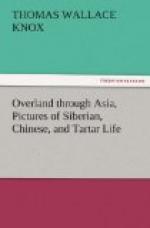The machine shops, foundries, and dock-yard are described in Russian by the single word ‘port.’ I visited the port of Nicolayevsk and found it more extensive than one might expect in this new region. There were machines for rolling, planing, cutting, casting, drilling, hammering, punching, and otherwise treating and maltreating iron. There were shops for sawing, planing, polishing, turning, and twisting all sorts of wood, and there were other shops where copper and brass could take any coppery or brassy shape desired. To sum up the port in a few words, its managers can make or repair marine and other engines, and produce any desired woodwork for house building or ship repairing. They build ships and equip them with machinery ready for sea.
The establishment is under the direct supervision of Mr. Woods, an American citizen of Scotch birth. Mr. Elliott, a Massachusetts Yankee, and Mr. Laney, an Englishman, are connected with the affair. Mr. Elliott had become a permanent fixture by marrying a Russian woman and purchasing a commodious house. The three men appeared to take great pride in what they had accomplished in perfecting the port.
It was a little curious to see at the mouth of the Amoor a steam fire engine from the Amoskeag Works at Manchester, N.H. The engine was labelled ‘Amoor’ in Russian characters, and appeared to be well treated. A house was assigned it, and watchmen were constantly on duty. The whole town being of wood it is highly important that the engine should act promptly in case of fire. The supply of hose was ample for all emergencies.
Several heavy guns were shown me, which were hauled overland from the Ural Mountains during the Crimean war and brought in boats down the Amoor. The expense of transporting them must have been enormous, their journey by roads to the head of the river being fully three thousand miles.
I spent a morning with Mr. Chase in calling upon several foreign merchants and their families. The most prominent of the merchants is Mr. Ludorf, a German, who went there in 1856, and has transacted a heavy business on the Amoor and in Japan and China. Mrs. Ludorf followed her husband in 1858, and was the first foreign lady to enter Nicolayevsk.
The most interesting topic to Mr. Chase and the ladies was that of cooks. Within two weeks there had been much trouble with the chefs de cuisine, and every housekeeper was in deep grief. Servants are the universal discomfort from the banks of the Hudson to those of the Amoor. Man to be happy must return to the primitive stages of society before cooks and housemaids were invented.




